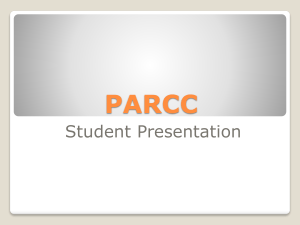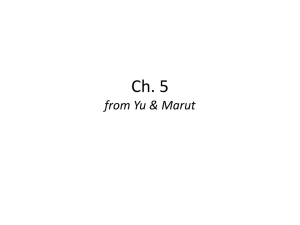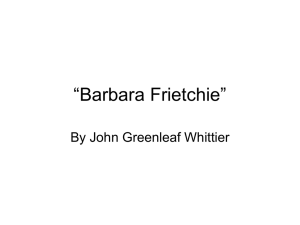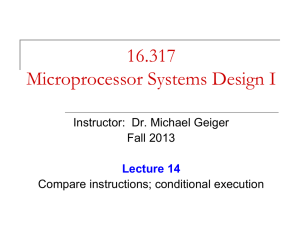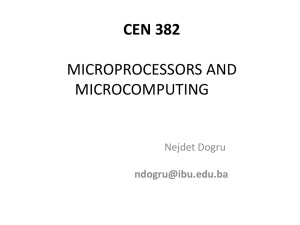Instructions—flag control, compare, conditional execution
advertisement
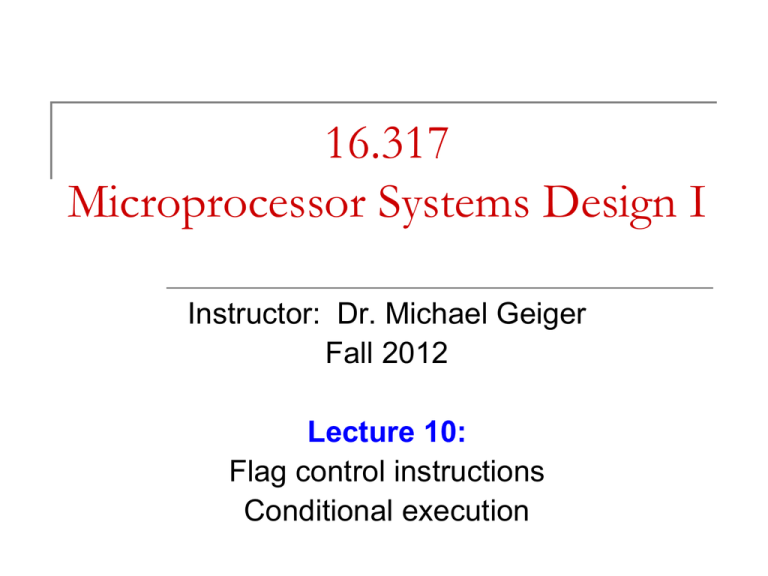
16.317 Microprocessor Systems Design I Instructor: Dr. Michael Geiger Fall 2012 Lecture 10: Flag control instructions Conditional execution Lecture outline Announcements/reminders HW 2 due today Next week: lecture on Tuesday, not Monday Exam 1: Wednesday, 2/20 Will be allowed calculator, one 8.5” x 11” double-sided note sheet Will be provided list of instructions Review Solution posted by Monday—no late submissions after that Rotate instructions Bit test/bit scan instructions Today’s lecture 4/8/2015 Flag control instructions Compare instructions Microprocessors I: Lecture 10 2 Review Rotate instructions: bits that are shifted out one side are shifted back in other side Rotate through carry instructions CF acts as “extra” bit that is part of value being rotated RCL <src>, <amt> or RCR <src>, <amt> Bit test instructions ROL <src>, <amt> or ROR <src>, <amt> CF = last bit rotated Check state of bit and store in CF Basic test (BT) leaves bit unchanged Can also set (BTS), clear (BTR), or complement bit (BTC) Bit scan instructions 4/8/2015 Find first non-zero bit and store index in dest. Set ZF = 1 if source non-zero; ZF = 0 if source == 0 BSF: scan right to left (LSB to MSB) BSR: scan left to right (MSB to LSB) Microprocessors I: Lecture 10 3 Flag Control Instructions Modifying the carry flag Used to initialize the carry flag Clear carry flag (CLC): CF = 0 Set carry flag (STC): CF = 1 Complement carry flag (CMC): CF = ~CF Modifying the interrupt flag 4/8/2015 Used to turn off/on external hardware interrupts Clear interrupt flag (CLI): IF = 0 Set interrupt flag (STI): IF = 1 Microprocessors I: Lecture 10 4 Flag Control Instructions- Example • • Debug flag notation • CF CY = 1, NC = 0 Example—Execution of carry flag modification instructions CY=1 CLC ;Clear carry flag STC ;Set carry flag CMC ;Complement carry flag 4/8/2015 Microprocessors I: Lecture 10 5 Loading and Saving the Flag Register • • • All loads and stores of flags take place through the AH register • Format of the flags in the AH register • B0 = CF • B2 = PF • B4 = AF • B6 = ZF • B7 = SF Load AH with content of flags registers (LAHF) AH = (Flags) Flags unchanged Store content of AH in flags register (SAHF) (Flags) = AH SF,ZF,AF,PF,CF updated 4/8/2015 Microprocessors I: Lecture 10 6 Loading and Saving the Flag Register • Application—saving a copy of the flags and initializing with new values LAHF ;Load of flags into AH MOV [MEM1],AH ;Save old flags at address MEM1 MOV AH,[MEM2] ;Read new flags from MEM2 into AH SAHF ;Store new flags in flags register 4/8/2015 Microprocessors I: Lecture 10 7 Flag Control Instructions- Example • • 4/8/2015 Example—Execution of the flags save and initialization sequence Other flag notation: Flag = 1/0 SF = NG/PL ZF = ZR/NZ AF = AC/NA PF = PE/PO Microprocessors I: Lecture 10 8 Example Given initial state shown in handout List all changed registers/memory locations and their values, as well as CF Instructions 4/8/2015 LAHF MOV MOV SAHF MOV CMC RCL [20H], AH AH, [30H] AX, [26H] AX, CL Microprocessors I: Lecture 10 9 Example solution LAHF MOV [20H], AH Address = DS:20H = 10110H Byte at 10110H = 00H MOV AH = Flags register = 00H AH, [30H] Address = DS:30H = 10120H AH = byte at 10120 = 1EH SAHF 4/8/2015 Flags register = AH = 1EH SF = Bit 7 = 0 ZF = Bit 6 = 0 AF = Bit 4 = 1 PF = Bit 2 = 1 CF = Bit 0 = 0 Microprocessors I: Lecture 10 10 Example solution (cont.) MOV Address = DS:26H = 10116H AX = word at 10116 = 4020H CMC AX, [26H] Complement CF CF = ~CF = ~0 = 1 RCL 4/8/2015 AX, CL Rotate AX left through carry by CL places (CF,AX) = 1 0100 0000 0010 00002 rotated left by 5 AX = 0000 0100 0001 01002 = 0414H, CF = 0 Microprocessors I: Lecture 10 11 Compare Instructions Compare 2 values; store result in ZF/SF General format: CMP D,S Works by performing subtraction (D) – (S) ZF/SF/OF indicate result (signed values) 4/8/2015 D, S unchanged ZF = 1 ZF = 0, (SF XOR OF) = 1 ZF = 0, (SF XOR OF) = 0 D == S D<S D>S Microprocessors I: Lecture 10 12 Compare Instructions- Example • Example—Initialization of internal registers with immediate data and compare. Example: MOV AX,1234H ;Initialize AX MOV BX,ABCDH ;Initialize BX CMP AX,BX ;Compare AX-BX • Data registers AX and BX initialized from immediate data IMM16 (AX) = 1234H + integer IMM16 (BX) = ABCDH - integer • Compare computation performed as: (AX) = 00010010001101002 (BX) = 10101011110011012 (AX) – (BX) = 00010010001101002 - 10101011110011012 ZF = 0 = NZ SF = 0 = PL ;treats as signed numbers CF = 1 = CY AF = 1 = AC OF = 0 = NV PF = 0 = PO 4/8/2015 Microprocessors I: Lecture 10 13 Condition codes Conditional execution: result depends on value of flag bit(s) Intel instructions specify condition codes Condition code implies certain flag values Opcodes written with cc as part of name cc can be replaced by any valid code Examples: SETcc, Jcc 4/8/2015 Specific examples: SETL, SETZ, JNE JG Microprocessors I: Lecture 10 14 Condition codes (cont.) Testing overflow alone Testing carry flag alone “Below” or “above” describes carry flag Used with unsigned comparisons B, NAE, or C (CF = 1) NB, AE, or NC (CF = 0) Testing sign flag alone O (OF = 1), NO (OF =0) S (SF = 1), NS (SF = 0) Testing parity flag alone 4/8/2015 P or PE (PF = 1) NP or PO (PF = 0) Microprocessors I: Lecture 10 15 Condition codes (cont.) Testing equality/zero result E or Z (ZF = 1) NE or NZ (ZF = 0) Codes that combine multiple flags Testing “above”/”below” and equality Testing less than/greater than 4/8/2015 BE or NA (CF OR ZF = 1) NBE or A (CF OR ZF = 0) L or NGE (SF XOR OF = 1) NL or GE (SF XOR OF = 0) LE or NG ((SF XOR OF) OR ZF = 1) NLE or G ((SF XOR OF) OR ZF = 0) Microprocessors I: Lecture 10 16 Final notes Next time: Exam 1 Preview (Tuesday) Reminders: HW 2 due today Next week: lecture on Tuesday, not Monday Exam 1: Wednesday, 2/20 4/8/2015 Solution posted by Monday—no late submissions after that Will be allowed calculator, one 8.5” x 11” double-sided note sheet Will be provided list of instructions Microprocessors I: Lecture 10 17


